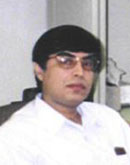
Mitra, Debasis

Debasis Mitra
Professor | College of Engineering and Science - Electrical Engineering and Computer Science
Contact Information
Personal Overview
Debasis Mitra is a Professor in the Department of Computer Science at Florida Institute of Technology. He received a Ph.D. in Computer Science from the Center for Advanced Computer Studies of the University of Louisiana at Lafayette. Mitra's first Ph.D. was in Physics from the Indian Institute of Technology at Kharagpur. He was an Assistant and Associate Professor in Computer Science at Jackson State University before joining Florida Institute of Technology. In the past Mitra has worked on reasoning with spatial and temporal knowledge. He is a recipient of the National Science Foundation Career Award and the Fulbright Scholarship.
Current research focus in Mitra's Lab is in Bio-medicine and Inverse Problems. The group is engaged in improving analysis of Nuclear Medical images of heart. A long term vision in the lab is to understand the molecular biology of Coronary Artery Desease for improving human health. The group also works on applications of Machine learning over Image understanding problems, from medical domains to archeology .
Students about to complete their Bachelor's/Master's/Ph.D. with mathematical background, strong interest in research, and interested in joining the group are welcome to contact Mitra.
Educational Background
M.S.-Physics, Indian Institute of Technology at Kharagpur
Ph.D.-Mathematical physics, Indian Institute of Technology at Kharagpur
Ph.D.-Comp. Sc., University of Louisiana at Lafayette
Professional Experience
Professorial ranks: Jackson State University, MS., and Florida Inst. of Tech., FL
Visiting researcher: Stanford University, CA; Lawrence Berkeley National Lab, CA; University of Paris, France; Vienna Inst. of Tech., Austria; Linkopings University, Sweden; Indian Inst. Tech. Mumbai, India; Tata Inst. of Fundamental Research Mumbai, India; and Asian Inst. of Tech. Bangkok, Thailand
Current Courses
Artificial Intelligence, Scientific Computing
Selected Publications
Liu et al. (2022) "Incorporating Radiomics into Machine learning models to predict outcomes of neuroblastoma". Jnl of Digital Imaging.35(3):605-612.
Sawant et al. (2022) “JetCurry I. Reconstructing three-dimensional jet geometry from two-dimensional images.” Astronomy and Computing, 41(10063).
“Exploration of PET and MRI radiomic features for decoding breast cancer phenotypes and prognosis.” Huang S-y, Franc BL, Harnish R, Liu G, Mitra D, Copeland TP, Arasu VA, Kornak J, Jones EF, Behr S, Hylton NM, Price ER, Esserman L, Seo Y. Nature Partners Journal Breast Cancer, Article number: 24, 2018. https://www.nature.com/articles/s41523-018-0078-2
Pan H, Chang H, Mitra D, Gullberg GT, and Seo Y. “Sparse domain approaches in dynamic SPECT imaging with high-performance computing.” American Journal of Nuclear Medicine and Molecular Imaging, 7(6):283-294, 2017.
“Clustering Initiated Factor Analysis (CIFA) Application for Tissue Classification in Dynamic Brain PET.” Boutchko R, Mitra D, Baker S, Jagust W, and Gullberg GT. Journal of Cerebral Blood Flow & Metabolism – Nature, doi:10.1038/jcbfm.2015.69, April 2015.
“Reconstruction of 4-D Dynamic SPECT Images From Inconsistent Projections Using a Spline Initialized FADS Algorithm (SIFADS).” Abdalah M, Boutchko, R, Mitra D, and Gullberg GT. IEEE Transactions in Medical Imaging, 34(1): 216-228, 2015.
"Explanation Generation over Temporal Interval Algebra," Debasis Mitra and Florent Launay. Book chapter in 'Qualitative Spatio-Temporal Representation and Reasoning: Trends and Future Directions.' Shyamanta M. Hazarika (Editor), Information Science Publishing, ISBN: 1616928689, August 1, 2010.
“GEANT4 Simulation of a Cosmic Ray Muon Tomography System with Micro-Pattern Gas Detectors for the Detection of High-Z Materials,” "Transactions on Nuclear Science", VOL. 56, NO. 3, JUNE 2009. Marcus Hohlmann, Patrick Ford, Kondo Gnanvo, Jennifer Helsby, David Pena, Richard Hoch, and Debasis Mitra.
“Muon Tomography Algorithms for Nuclear Threat Detection,” Richard Hoch, Debasis Mitra, Marcus Hohlman, and Kondo Gnanvo.Lecture Notes in Artificial Intelligence, Series: “Next-Generation Applied Intelligence.” Chien BC, Hong TP, Chen SM, and Ali M. (Eds) Springer Verlag, 214: 225-231, 2009.
Recognition & Awards
Academic Excellence award, the Legislature of the State of Mississippi
Career Award, National Science Foundation
Research Fellow, Fulbright foundation
Research
Medical Imaging: processing nuclear medical images for improving diagnosis and prognosis.
Inverse problem: sparse optimization, tomographic reconstruction for emission, transmission, and scattering tomography.
Machine learning: deep learning on medical images, topological data analysis.
Writing non-fictions


 Give to Florida Tech
Give to Florida Tech